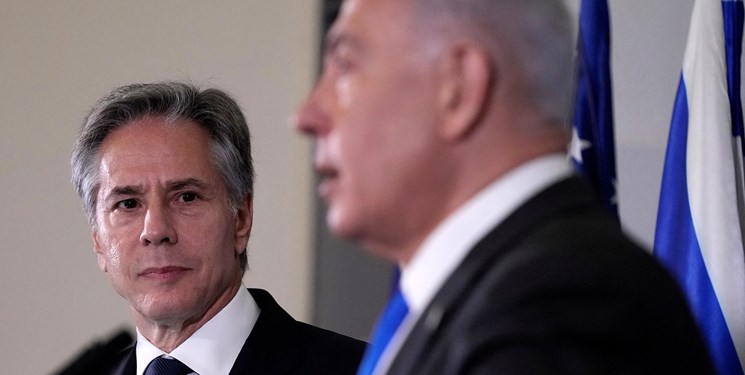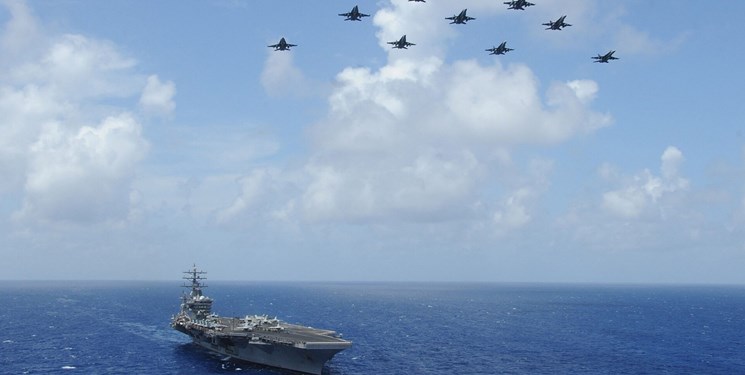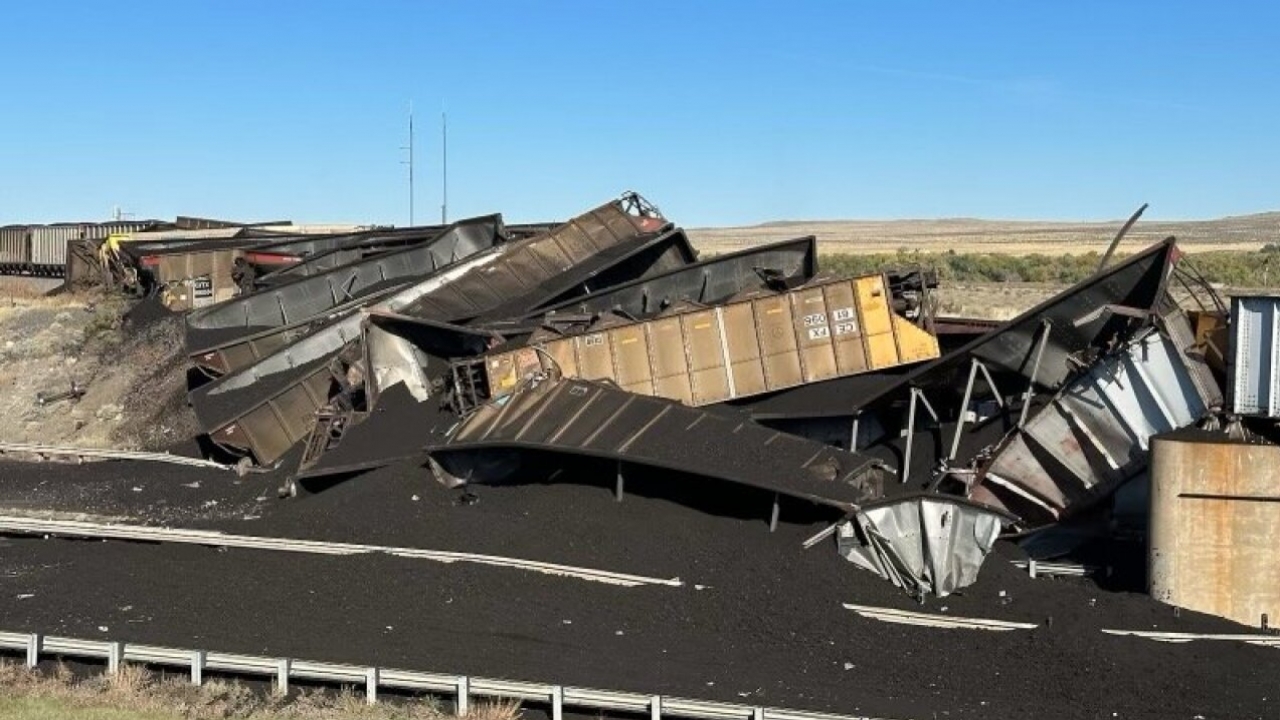Americans want US to help get Gaza civilians out of harm’s way: Survey
A poll shows 78 percent of American respondents want Washington to work on a plan to allow civilians in Gaza to flee Israel’s bombardments.
'We can’t bomb our way to peace,' Bush said in a statement announcing the resolution
A group of Democratic lawmakers on Monday introduced a resolution calling for an immediate de-escalation and ceasefire in Israel, where Israeli forces are targeting the Gaza Strip after being attacked by the militant group Hamas.
"The United States bears a unique responsibility to exhaust every diplomatic tool at our disposal to prevent mass atrocities and save lives," Rep. Cori Bush, D-Mo., said in a press release. "We can’t bomb our way to peace, equality, and freedom. With thousands of lives lost and millions more at stake, we need a ceasefire now.”
Bush, alongside Reps. Rashida Tlaib, D-Mich., André Carson, D-Ind., Summer Lee, D-Pa., and Delia Ramirez, D-Ill., are leading the effort to support the resolution. The group is joined in support by Reps. Jamaal Bowman, D-N.Y., Bonnie Watson Coleman, D-N.J., Jesús García, D-Ill., Jonathan Jackson, D-Ill., Alexandria Ocasio-Cortez, D-N.Y., Ilhan Omar, D-N.Y., Ayanna Pressley, D-Mass., and Nydia Veláquez, D-N.Y.
As the House of Representatives does not currently have a Speaker, the resolution cannot be voted on.
Negotiations are ongoing for aid to enter Gaza.
Sulaiman Daud |
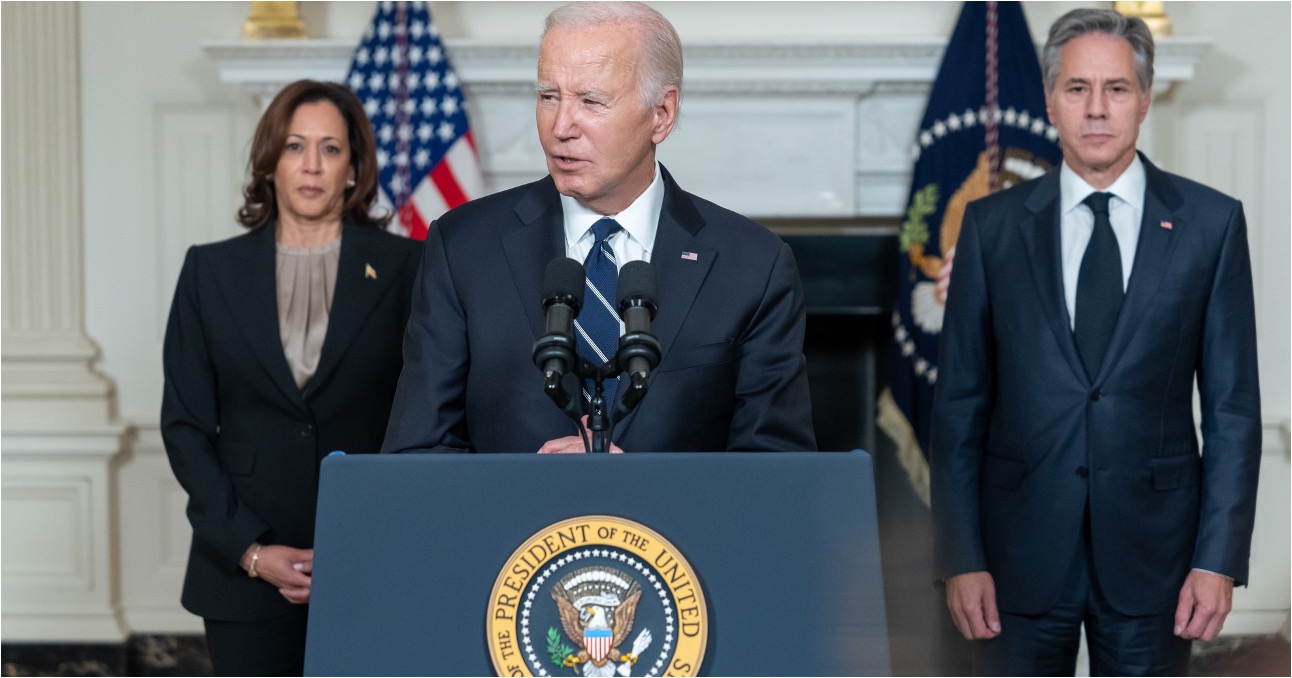
In an interview on "60 Minutes", as reported by CBS, Biden touched upon a number of other issues related to Israel's war against Hamas, and spoke of the efforts his administration is undertaking to help alleviate the mounting humanitarian crisis in Gaza.
Israel-Hamas war
Following the attacks, massacres and abductions conducted by Hamas militants out of Gaza in southern Israel on Oct. 7, the Israeli military responded with airstrikes and a siege of Gaza, cutting off electricity, fuel and water.
This raised concerns of a humanitarian crisis within Gaza, with bodies like the United Nations and the World Health Organization sounding warnings against the siege.
They also spoke up against Israel's 24-hour ultimatum for Gazans to evacuate the northern area and move to the south, ahead of a likely ground military offensive. Israel believes Hamas militants are sheltering in tunnels under certain buildings in northern Gaza.
However, the UN pointed out the sheer logistical difficulties involved in asking 1.1 million people to evacuate within 24 hours.
The deadline appears to have been extended unofficially, but there is no clear indication as to how long it will last.
Humanitarian corridor
During his interview, Biden called Hamas a "bunch of cowards" and pointed out that they are hiding among civilians in Gaza, and deliberately situated their headquarters in civilian areas.
Hamas leaders have called upon Gazans not to flee northern Gaza, Al Jazeera reported.
Biden also pointed out that Israel "has to respond" after Hamas engaged in "barbarism" against civilians, both Israeli and foreign.
"60 Minutes" interviewer Scott Pelley asked Biden about the creation of a humanitarian corridor into Gaza, to allow humanitarian supplies in and some refugees out.
Biden said his administration is speaking to the Israelis about a possible safe zone, and also to the Egyptians about evacuees. However, he said it's "hard".
The Rafah crossing on the Egyptian border is not controlled by Israel, but Egypt has backed the blockade of the Gaza Strip since 2007, when Hamas took over Gaza.
There were earlier reports of discussions with Egypt to open such a corridor, with Egyptian president Abdel Fattah Al-Sisi indicating that allowing aid to enter was likely, but accepting refugees was less likely.
However, Reuters reported that U.S. Secretary of State Antony Blinken, speaking to reporters in Cairo, Egypt on Oct. 15, said that he had a good conversation with Al-Sisi and Rafah will be "re-opened".
Hamas does not represent Palestine. There has to be a path to a Palestinian state.
Biden then addressed the important distinction that Hamas does not represent the entirety of the Palestinians.
Pelley asked about the siege, to which Biden said that democratic countries hold to certain standards and was confident that Israel would act under the rules of war.
However, Biden said he opposed Israeli occupation of Gaza, calling it a big mistake.
"Look, what happened in Gaza, in my view, is Hamas and the extreme elements of Hamas don't represent all the Palestinian people. And I think that...It would be a mistake to...for Israel to occupy...Gaza again."
He then emphasised that the elimination of Hamas is a "requirement", and that there needs to be a Palestinian authority and state.
"Pelley: Do you believe that Hamas must be eliminated entirely?
Biden: Yes, I do. But there needs to be a Palestinian authority. There needs to be a path to a Palestinian state."
You can read the full transcript of Biden's interview here at CBS.
Water supply
AP reported that water has run out at UN shelters across Gaza as a result of the siege.
Across Gaza, families have resorted to rationing their water, drinking dirty or brackish water or even going to the sea, increasing the risk of disease.
Power outages have compounded the crisis, with hospital staff worried that they would be unable to provide critical care for patients once the fuel for generators runs out.
The Wall Street Journal reported that White House National Security Advisor, Jake Sullivan, said in an interview with CNN that Israel had "turned the water pipe back on" in southern Gaza.
Sullivan added that the Biden Administration's goal is to ensure innocent Palestinians get access to basic commodities and are protected from bombardment.
However, AP cited aid workers in Gaza who had not seen the water come back on, and quoted a spokesperson from the Gaza government who said it was "not flowing."
Galit Altstein, Henry Meyer and Salma El Wardany
Mon, October 16, 2023


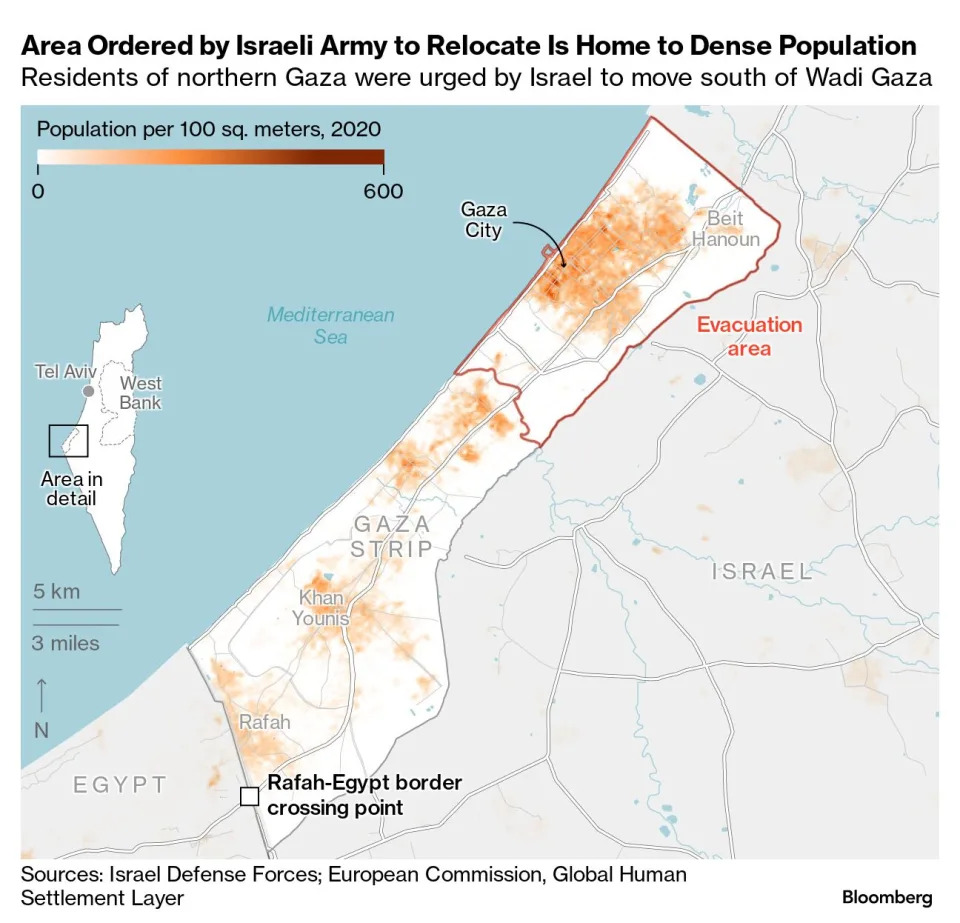
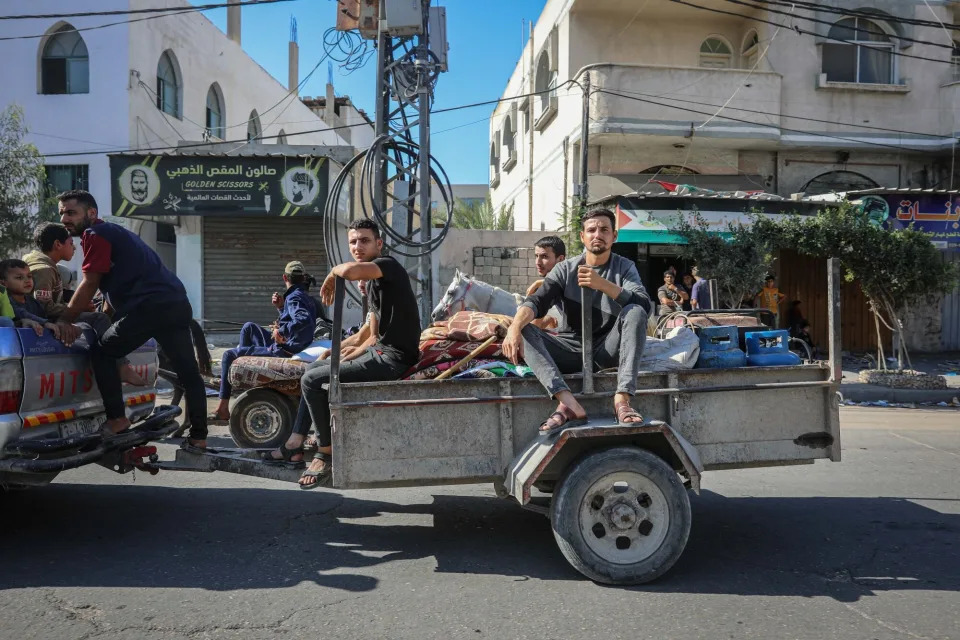
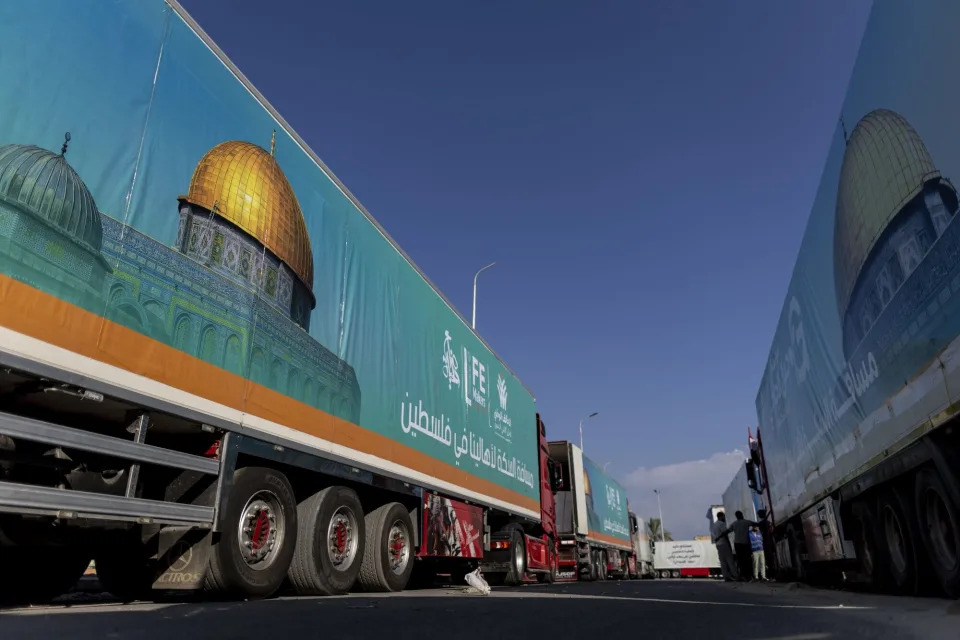
(Bloomberg) -- Israel announced another “safe corridor” in Gaza as it urges civilians to move to the south of the territory from the north, where it’s concentrating the bulk of its military activities.
The Israel Defense Forces said it would “refrain from targeting a designated axis” between 8 a.m. and midday local time on Monday “to allow safe evacuation from north Gaza to the area south of Wadi Gaza and Khan Yunis.”
Israel Latest: Blinken Set to Return as US Tries to Contain War
Israel has made similar daily announcements since Saturday. The military is urging civilians to move for their own safety and last night said that 600,000 people had left northern Gaza. Israel is blaming Hamas for trying to stop civilians evacuating. It has emphasized that the safe corridor does not amount to a ceasefire.
Over one million people, around half the total population of Gaza, have already been displaced, according to the United Nations Relief and Works Agency, which serves Palestinian refugees. It said 400,000 have taken refuge in UNRWA facilities, “much exceeding our capacity to assist in any meaningful way, including with space in our shelters, food, water or psychological support. ”
According to the United Nations, the IDF initially set a 24-hour deadline for the evacuation when it was first called for on Friday. The UN said that would involve the movement of 1.1 million people, most of them in and around Gaza City, and would be “impossible.” Israel denies it ever gave a deadline of 24 hours.
Israel is widely expected to launch a ground assault on Gaza as it looks to “wipe out” Hamas following the group’s Oct. 7 attacks, which killed at least 1,300 Israelis. More than 2,650 people have since been killed in Gaza because of Israeli airstrikes.
The enclave, which is ruled by Hamas, is now under a near-total blockade. Israel isn’t allowing people or goods in or out and has cut power to it.
Convoys of humanitarian aid are lined up in Egypt’s Sinai peninsula waiting to cross into Gaza, according to the head of the Egyptian Food Bank, an aid organization. That’s in anticipation of the Rafah crossing between Gaza and Egypt being opened for a short while to allow aid deliveries, though none of the Egyptians, Israelis or Hamas have confirmed that will happen.
A Million Gazans Have Nowhere to Hide From Coming Israel Troops
Israel said that 199 people are confirmed to have been taken as hostages to Gaza during the Oct. 7 attacks, when Hamas and other militants swarmed into southern Israel and rampaged through communities and military bases.
Hezbollah Tensions
Separately on Monday, the IDF said it would evacuate residents of northern Israel, near the border with Lebanon. Tensions there are rising with Hezbollah and the Israeli military exchanging fire frequently.
Read more: Your Guide to Understanding the Roots of the Israel-Hamas War
Israeli residents living within 2 kilometers (1.2 miles) of the border will be moved to state-funded guest houses. Israel has already evacuated communities and towns near Gaza in the south.
The IDF said its response to a more aggressive action from Hezbollah, one of the most powerful militias in the Middle East, would be “lethal.”
Hamas and Hezbollah are both backed by Iran and designated as terrorist groups by the US.
Bloomberg Businessweek


